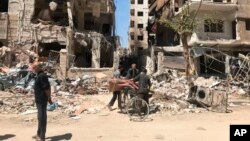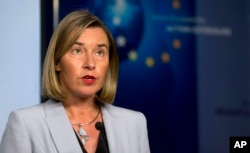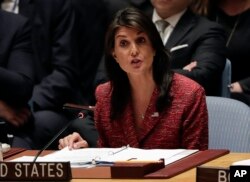Russia said Monday it will not interfere with the work of a fact-finding mission investigating an alleged chemical attack last week near Syria's capital.
The Organization for the Prohibition of Chemical Weapons has sent a team to Syria to probe what happened in Douma, and the watchdog held an emergency meeting Monday in The Hague to discuss the situation.
Britain, France and the United States all say Syrian President Bashar al-Assad's forces were responsible for using chemical weapons in Douma, which Syria and Russia deny. The three Western allies launched coordinated airstrikes Saturday that hit several sites linked to Syria's chemical program.
British Foreign Secretary Boris Johnson said Monday the strikes were "entirely the right thing to do."
"I'm afraid the Syrian war in many ways will go on in its horrible, miserable way. But it was the world saying that we've had enough of the use of chemical weapons," Johnson said.
He spoke as European foreign ministers gathered to discuss the situation in Syria. The EU reiterated its condemnation of the use of chemical weapons on Syria, including the most recent reported attack, and said it supports the work of international chemical weapons investigators.
EU foreign policy chief Federica Mogherini also said there is a clear need to push for relaunching a U.N.-led peace process. She called on Russia and Iran to use their influence as allies of Syrian President Bashar al-Assad to "start serious and meaningful discussions under U.N. auspices in Geneva."
Also Monday, the United States is expected to unveil new sanctions against Russia. U.S. Ambassador to the U.N. Nikki Haley told CBS News the measures would "go directly to any sort of companies that were dealing with equipment related to Assad and chemical weapons use."
In a separate interview with Fox News, Haley warned Assad that the U.S. would launch new missile strikes against his government if he carries out another chemical weapons attack.
Haley said, "If Assad doesn't get it" after Saturday's barrage of 105 missiles fired by the U.S., Britain and France at three Syrian chemical weapons facilities, "it's going to hurt. There will be more. We can't allow even the smallest use of chemical weapons."
She said that it is "entirely up to Assad" whether the missile attack on Syria was a one-time response to the suspected chemical attack by Syrian forces a week ago that killed more than 40 people or part of a continuing allied military effort.
"We'll see how smart he is," Haley said. "We'll watch his actions. Hopefully he's gotten the message."







